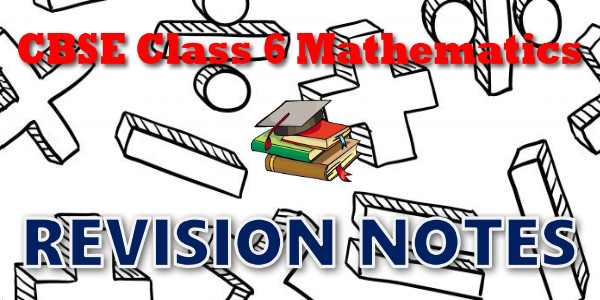CBSE - Class 06 - Mathematics - CBSE Revision Notes

CBSE, JEE, NEET, CUET
Question Bank, Mock Tests, Exam Papers
NCERT Solutions, Sample Papers, Notes, Videos
CBSE Revision Notes for Class 06 Mathematics

myCBSEguide App
Complete Guide for CBSE Students
NCERT Solutions, NCERT Exemplars, Revison Notes, Free Videos, CBSE Papers, MCQ Tests & more.

Student Subscription
Unlock the exclusive content designed for the toppers

myCBSEguide App
Complete Guide for CBSE Students
NCERT Solutions, NCERT Exemplars, Revison Notes, Free Videos, CBSE Papers, MCQ Tests & more.
CBSE Revision Notes for class 6 Mathematics

CBSE revision notes for class 6 Mathematics NCERT chapter wise notes of 6th Mathematics CBSE key points and chapter summary for 6 Mathematics all chapters in PDF format for free download. CBSE short key notes and chapter notes for revision in exams. CBSE short notes of 6th class Mathematics. Summary of the chapter for class 6 Mathematics are available in PDF format for free download. These NCERT notes are very helpful for CBSE exam. CBSE recommends NCERT books and most of the questions in CBSE exam are asked from NCERT text books. These notes are based on latest NCERT syllabus and designed as per the new curriculum issued by CBSE for this session. Class 6 Mathematics chapter wise NCERT note for Mathematics part and Mathematics for all the chapters can be downloaded from website and myCBSEguide mobile app for free.
CBSE Class 6 Notes and Key Points
- CBSE Revision notes (PDF Download) Free
- CBSE Revision notes for Class 6 Mathematics PDF
- CBSE Revision notes Class 6 Mathematics – CBSE
- CBSE Revisions notes and Key Points Class 6 Mathematics
- Summary of the NCERT books all chapters in Mathematics class 6
- Short notes for CBSE class 6th Mathematics
- Key notes and chapter summary of Mathematics class 6
- Quick revision notes for CBSE exams
CBSE Class 6 Mathematics Chapter-wise Revision Notes
- Chapter 1 - Knowing Our Numbers
- Chapter 2 - Whole Numbers
- Chapter 3 - Playing with Numbers
- Chapter 4 - Basic Geometrical Ideas
- Chapter 5 - Understanding Elementary Shapes
- Chapter 6 - Integers
- Chapter 7 - Fractions
- Chapter 8 - Decimals
- Chapter 9 - Data Handling
- Chapter 10 - Mensuration
- Chapter 11 - Algebra
- Chapter 12 - Ratio and Proportion
- Chapter 13 - Symmetry
- Chapter 14 - Practical Geometry
Free Download of CBSE Class 06 Revision Notes
Key Notes for CBSE Board Students for Class 06 Important topics of all subjects are given in these CBSE notes. These notes will provide you overview of the chapter and important points to remember. These are very useful summary notes with neatly explained examples for best revision of the book.
CBSE Class-06 Revision Notes and Key Points
CBSE class-06 Key points and summary of the lessons is given under this section for Science, Mathematics, Hindi, English, Social Science and other subjects. The notes includes all concepts given in NCERT books and syllabus issued by CBSE for class-06. Key notes are 'to the point' capsules for quick revision of the chapter. We have covered the whole syllabus in these notes.
- Revision Notes for class-06 Mathematics
- Revision Notes for class-06 Science
- Revision Notes for class-06 Social Science
Revision Notes
CHAPTER – 2
Whole Numbers
- The numbers 1, 2, 3, …… which we use for counting are known as natural numbers.
- If you add 1 to a natural number, we get its successor. If you subtract 1 from a natural number, you get its predecessor.
- Every natural number has a successor. Every natural number except 1 has a predecessor.
- If we add the number zero to the collection of natural numbers, we get the collection of whole numbers. Thus, the numbers 0, 1, 2, 3, ... form the collection of whole numbers.
- Every whole number has a successor. Every whole number except zero has a predecessor.
- All natural numbers are whole numbers, but all whole numbers are not natural numbers.
- We take a line, mark a point on it and label it 0. We then mark out points to the right of 0, at equal intervals. Label them as 1, 2, 3, .... Thus, we have a number line with the whole numbers represented on it. We can easily perform the number operations of addition, subtraction and multiplication on the number line.
- Addition corresponds to moving to the right on the number line, whereas subtraction corresponds to moving to the left. Multiplication corresponds to making jumps of equal distance starting from zero.
- Adding two whole numbers always gives a whole number. Similarly, multiplying two whole numbers always gives a whole number. We say that whole numbers are closed under addition and also under multiplication. However, whole numbers are not closed under subtraction and under division.
- Division by zero is not defined.
- Zero is the identity for addition of whole numbers. The whole number 1 is the identity for multiplication of whole numbers.
- You can add two whole numbers in any order. You can multiply two whole numbers in any order. We say that addition and multiplication are commutative for whole numbers.
- Addition and multiplication, both, are associative for whole numbers.
- Multiplication is distributive over addition for whole numbers.
- Commutativity, associativity and distributivity properties of whole numbers are useful in simplifying calculations and we use them without being aware of them.
- Patterns with numbers are not only interesting, but are useful especially for verbal calculations and help us to understand properties of numbers better.

myCBSEguide
Trusted by 1 Crore+ Students

Test Generator
Create papers online. It's FREE.

CUET Mock Tests
75,000+ questions to practice only on myCBSEguide app
 myCBSEguide
myCBSEguide